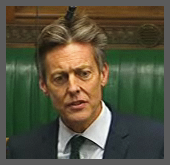 On EU nationals in the NHS
On EU nationals in the NHS
Mr Ben Bradshaw (Exeter) (Lab)
It will take many years for the doctors the Secretary of State has just talked about to come on stream, and we have a workforce crisis in the NHS now, partly because of the cuts the Government made in the last Parliament, but also because of their irrational pursuit of the hardest of Brexits. He could do something very simple today to address this crisis in the short term, and that is to announce that all EU nationals who do vital work in our NHS will be able to stay when we leave the European Union.
Mr Hunt
The one simple thing the Government are not going to do is refuse to listen to what the British people said when they voted on 23 June. We will do what they said—it is the right thing to do. However, the right hon. Gentleman is absolutely right to highlight the vital role that the around 10,000 EU doctors in the NHS play in this country. I can reassure him that the number of doctors joining the NHS from the EU was higher in the four months following the referendum result than in the same four months the previous year.
On Russia
Mr Ben Bradshaw (Exeter) (Lab)
Are the Government or any other public agency in Britain investigating whether laundered Russian money was channelled to any individuals in either the leave campaign or the Trump presidential campaign? Is the Minister aware of any other investigations?
Simon Kirby
I make it clear that I am not aware of any connection. It is right and proper that the FCA and the NCA have been watching that issue for some time. It is a confidential matter; if there is new information, I am sure they will consider it.
On President Trump
Mr Ben Bradshaw (Exeter) (Lab)
But what damage is done by fantastical and ridiculous outbursts like those levelled at GCHQ by President Trump? Will the Foreign Secretary assure the House that our invaluable intelligence relationship with the United States is not compromised by the current incumbent of the White House?
Boris Johnson
The damage done by such remarks can be likened to that of a gnat against a rhinoceros or an elephant. They will not make any difference to a fundamental relationship that is, as I say, of great international importance. As for the assertion that there was some sort of collusion by GCHQ to bug the presidential candidate, I think that has been accurately described as absurd and ridiculous.
On HIV treatment
Mr Ben Bradshaw (Exeter) (Lab)
I congratulate the hon. Member for Finchley and Golders Green (Mike Freer) on securing this debate, on his all-party group’s excellent report and, indeed, on all the work he does on HIV and AIDS. I draw attention to my entry in the Register of Members’ Financial Interests and declare an interest: I am a trustee of the Terrence Higgins Trust.
The hon. Member for Finchley and Golders Green is absolutely right, as is his report, on the impact of the Health and Social Care Act 2012 passed in the previous Parliament. I am sure the Minister has read not only his APPG’s report but the Health Committee report that we published last year on public health in general and the impact of that 2012 legislation on the delivery of public health, and particularly the delivery of sexual health and HIV services across the country.
The hon. Gentleman is right that in our report, we identified a number of problems and challenges with the new landscape and commissioning structure. We heard from people up and down the country in evidence—HIV/AIDS organisations, those who work in sexual health, consultants and virtually everyone else—that the area that has been hit most negatively by the Health and Social Care Act and the changes in commissioning arrangements are HIV services and sexual health services more generally. We all have our own ideas of why that might be the case. Although the jury is still out about the decision to pass the responsibility for public health to local authorities, there were concerns expressed at the time of the Health and Social Care Act—some of us warned the then Health Secretary, Andrew Lansley—about the potential impact of giving local authorities the responsibility for HIV support and other sexual health services, but I am afraid those concerns were not listened to. I hope the Minister will explain to hon. Members and to the country at large what monitoring the Government have been doing on the impact of the Act on services and what measures or action the Government will take as a result of anything they find.
Dr Poulter
I agree with the right hon. Gentleman. Does he agree one the challenge is the fact that local authorities are now commissioning the provision of health services in complete isolation from many of the other HIV and associated services? That is very different from our general understanding of public health at the core of the Act—it is a fault.
Mr Bradshaw
I completely agree with that point. The different commissioning responsibilities for different bits of sexual health and HIV and AIDS are all over the place. On top of that, although the Government can, with some justification, claim to have protected NHS spending in cash terms if not in real terms, they cannot claim to have done that when it comes to public health, which has taken significant cuts and will continue to take significant cuts over the next few years. Of course, those cuts are being imposed on local government. As the hon. Gentleman and other hon. Members know, local government faces huge financial challenges across the piece. There is also the threat of the withdrawal of the ring fence on public health funding in the next two or three years. In our report we made it clear that we thought that was a risky move indeed.
I do not want to repeat a lot of what was said by the hon. Member for Finchley and Golders Green, who made a comprehensive and excellent speech, but I hope the Minister will explain to us what monitoring the Government are doing on the impact. What will they do in response both to the concerns raised and the recommendations of the all-party group report and our Select Committee report to address the problems? We have known about them for some time—our report is now more than a year old.
The news about PrEP is very welcome, but will the Minster clarify the timing of the commencement of the trial? While we are on the subject, another potentially welcome development is the big fall-off in HIV presentations or positive tests at some of the London clinics in the past few months, which some people suggest may be to do with the availability of PrEP. Can the Minister tell us whether she has made an assessment as to whether that is the case, in which case it is a promising development indeed?
Finally, one of the things that concerns me is the plight of older people living with HIV and AIDS. Around a third of the people in Britain now living with HIV and AIDS are over 50. About 60% of them live at or below the poverty line. When many of them were originally diagnosed, they did not expect to have a long life expectancy, but they are still here thanks to the fantastic treatment and care that has been invented and developed, which has not only helped to keep people alive but enabled them to lead lives of reasonable quality. Back when they were diagnosed, they may have been less cautious about spending their money to get by at that time, and now they find themselves hopefully with many years stretching ahead and no more means at their disposal, so there is a particular challenge when it comes to older people living with HIV and AIDS. That will require the Department of Health to work more closely with the Department for Work and Pensions. Some of the people that my charity—the Terrence Higgins Trust—deals with face problems when it comes to benefits and benefits sanctions. Those sorts of things add extra pressure and misery to the challenges that people living with HIV already face.
On Article 50
Mr Ben Bradshaw (Exeter) (Lab)
In her letter and again in her statement today, the Prime Minister has made it clear that she believes it will be necessary to agree the terms of the divorce alongside the details of our future relationship with the European Union. If the other 27 come back in their reply and say that they want to agree the terms of the divorce first, including the issues of citizenship rights, our liabilities and borders, particularly with Northern Ireland, how will she respond?
The Prime Minister
We will go into a negotiation with the European Union about the best way to take these issues forward. I have been putting forward the case, as have other Ministers, that it makes sense from a pragmatic point of view to ensure that at the end of the two years, we have both of these decisions concluded, namely the withdrawal process and the future relationship. That is because I do not think it is in anybody’s interest for the UK to agree withdrawal, withdraw and go on to one set of arrangements, subsequently having to negotiate another set of arrangements that come into place at a later date. It makes much better sense—for individuals, for businesses and indeed for Governments—to conclude those two parts of the negotiation at the same time.

